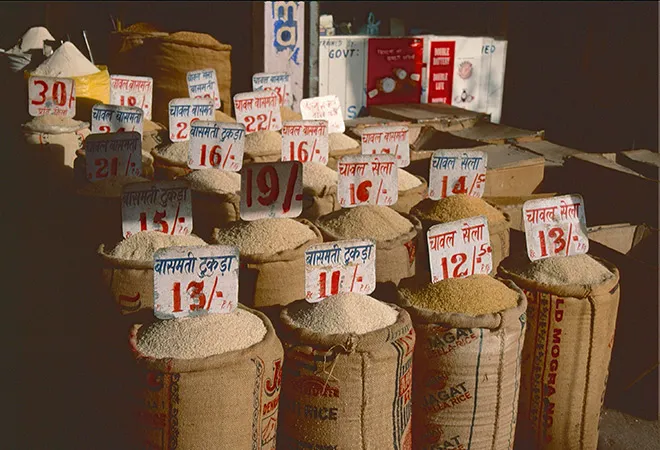
The following is a chapter from the book
70 Policies that Shaped India: 1947 to 2017, Independence to $2.5 Trillion.
Find the book here.
Enacted on 1 April 1955, the Essential Commodities Act <1> is a law that has helped the government regulate the production, supply and distribution of ‘essential’ commodities such as drugs, oils, kerosene, coal, iron, steel and pulses. Under delegated powers, the Act empowers state governments <2> and Union Territory administrations to implement the law, which the central government monitors. This it has done by making the commodities available to consumers at 532,000 fair price shops <3> spread across India, which have been licensed to distribute such commodities. At a time when India was emerging from the aftermath of Partition and shortages, the objective was to protect citizens from exploitation by unscrupulous traders. <4> The executive tool of regulation was to control the hoarding of a commodity. Hand in hand with the Prevention of Blackmarketing and Maintenance of Supplies of Essential Commodities Act, 1980, <5> government officials could detain or imprison hoarders (when introduced as an ordinance, it was criticised as being used to supress political opposition to detain without trial <6>). According to a Department of Consumer Affairs report, 123 between 2009 and 2014, under the ECA, 1.1 million raids were conducted, of which about 54,000 people (five percent) were arrested and 30,000 (2.7 percent) prosecuted, but only 1,381 or 0.12 percent were convicted. This shows a potential arbitrariness in the enforcement of the Act, part of which could be ascribed to errors of omission and part to commission. Certain provisions in the Act that discourage largescale private investments in agricultural markets must be re-examined. <7> This re-examination and the accompanying changes must be done keeping the first principle of the law — ensuring essential supplies to the people and preventing exploitation by ‘unscrupulous’ traders — in mind. This may be done, for instance, by providing exemptions to exporters, food processors, multiple outlet retailers and large departmental retailers from applicability of stock limits, a 2015 NITI Aayog occasional paper titled Raising Agricultural Productivity and Making Farming Remunerative for Farmers noted. What the Act fails to see is that the era of shortages is now well behind us and the law needs to move with the times.
<1> The Essential Commodities Act, 1955, Ministry of Law and Justice, Government of India, 1 April 1955.
<2> Ibid., Section 5.
<3> Arthapedia, Indian Economic Service, Government of India, accessed 3 January 2018.
<4> Surbhi Jain, “Essentail Commodities Act,” Arthapedia, Indian Economic Service, 4 December 2015, accessed 12 June 2018.
<5> The Prevention of Blackmarketing and Maintenance of Supplies of Essential Commodities Act, 1980, Ministry of Law and Justice, Government of India, 12 February 1980.
<6> “Return of Preventive Detention,” Economic and Political Weekly 14, no. 40, (6 October 1979): 1657–1658, accessed 3 January 2018.
<7> Study on Implementation of Essential Commodities Act, 1955, and the Prevention of Black Marketing & Maintenance of Supplies of Essential Commodities Act, 1980, Exhibit No. 1.1, Action Taken Under the Essential Commodities Act, 1955, During the Years 2009–14, 7, accessed 3 January 2018.
<8> Raising Agricultural Productivity and Making Farming Remunerative for Farmers, NITI Aayog, Government of India, 16 December 2015, accessed 3 January 2018.
The views expressed above belong to the author(s). ORF research and analyses now available on Telegram! Click here to access our curated content — blogs, longforms and interviews.



 The following is a chapter from the book 70 Policies that Shaped India: 1947 to 2017, Independence to $2.5 Trillion.
Find the book
The following is a chapter from the book 70 Policies that Shaped India: 1947 to 2017, Independence to $2.5 Trillion.
Find the book  PREV
PREV



